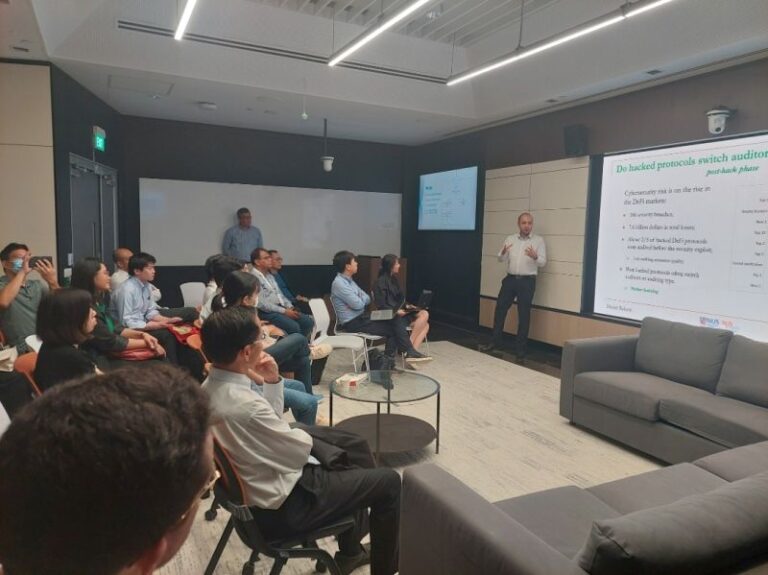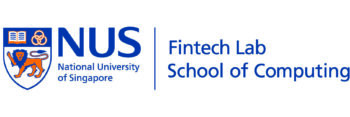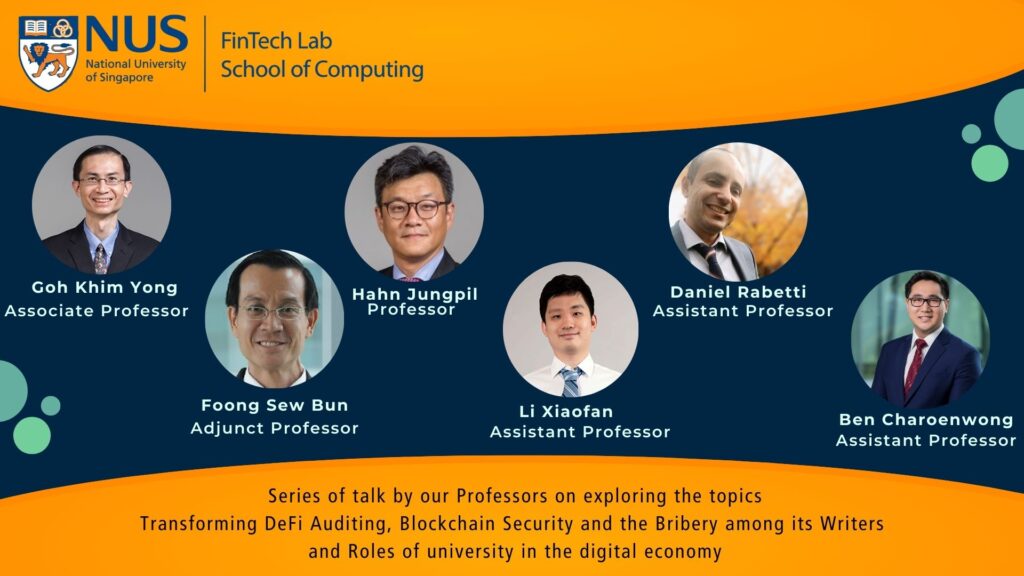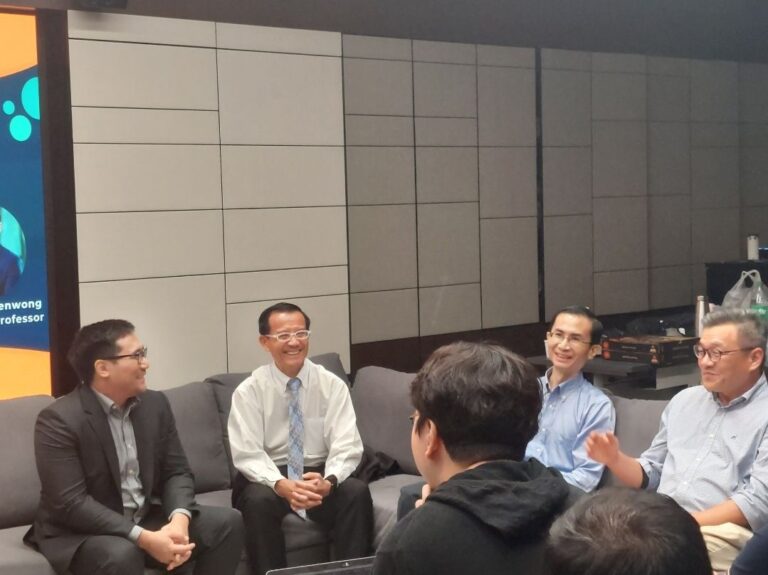NUS FinTech Lab Innovation Lab Crawl
Session 1 - Transforming DeFi Auditing: Profound Insights from Prof Daniel Rabetti.
In this session, Prof. Daniel Rabetti delved into the complex and evolving world of DeFi (Decentralized Finance) auditing. His presentation offered crucial insights into the future of financial oversight in the blockchain era.
3 Key Takeaways from his session:
1. Decentralized Auditing Governance: The session underscored the pressing need for a shift towards decentralized governance in DeFi auditing. It was highlighted how the dominance of a few auditors necessitates the adoption of more standardized and transparent auditing procedures. This approach is critical to maintain trust and integrity in the fast-evolving DeFi landscape, ensuring alignment with its foundational principles of decentralization.
2. Harmonizing Economic Growth with Enhanced Security: A key insight from the presentation was the noticeable disconnect between the economic growth of audited DeFi protocols and their susceptibility to cyber-attacks. This observation calls for a thorough reassessment of existing auditing frameworks, underlining the necessity of robust procedures that not only support economic growth but also provide effective safeguards against cybersecurity threats.
3. Specialized Expertise in DeFi Auditing: The presentation highlighted the dynamic nature of the DeFi market, especially in its response to security breaches. It stressed the importance of continuous innovation in auditing practices, along with the development of specialized knowledge and strategies by auditors. Such expertise is crucial for effectively addressing the unique risks and challenges inherent in DeFi protocols.
Collaborative efforts involving academia, industry, and regulators are essential in developing sophisticated auditing frameworks and security protocols, with institutions like the National University of Singapore playing a pivotal role in driving forward research and innovation in DeFi auditing.
We extend our appreciation to Prof. Daniel Rabetti for his invaluable insights, which shed light on the urgent need for refined auditing standards, a better understanding of audits’ impact on security, and the cultivation of specialized expertise in the evolving DeFi auditing domain.

Session 2 - Blockchain Security and the Bribery among its Writers
At the heart of this year’s Singapore FinTech Festival, Prof. Li Xiao Fan’s presentation at the NUS FinTech Lab marked a defining moment in our understanding of blockchain technology. His session, “Blockchain Security and the Bribery among its Writers,” provided a deep dive into the complexities and evolving nature of blockchain systems, offering vital insights to industry professionals, regulators, and academia.
Here are 3 key insights that stood out:
1. Revolutionizing Blockchain Security and Integrity: The evolution of blockchain systems underscores the crucial need for robust security measures. Highlighting the notion that decentralization doesn’t equate to independence, this research delves into the human and social factors influencing blockchain integrity. The concept of P + epsilon attacks, though theoretically feasible, highlights the importance of ongoing research to address evolving threats and vulnerabilities. This insight is pivotal in ensuring the future-proofing of blockchain technology against sophisticated security challenges.
2. Strategic Shifts and System Design in Blockchain: The transition from Proof of Work (POW) to Proof of Stake (POS) systems marks a significant leap in blockchain technology, offering enhanced security and energy efficiency. This shift is more than a technical upgrade; it’s a fundamental alteration in the blockchain’s power dynamics and requires strategic planning and thoughtful implementation. The presentation stresses the importance of a multidisciplinary approach in blockchain system design. Incorporating perspectives from game theory and political science, it emphasizes the need for strategic considerations that encompass security, economic incentives, and power dynamics within blockchain systems.
3. Blockchain’s Transformative Impact and Future Horizons: Blockchain technology is set to revolutionize not only financial services but a wide array of industries, promising greater transparency, efficiency, and security. This versatility opens up immense opportunities for rethinking operational models across sectors. However, challenges like scalability, regulatory uncertainties, and infrastructure needs are also acknowledged. Addressing these challenges paves the way for innovations and collaborative efforts.
A big shout-out to Prof. Li Xiaofan. Your contribution to this field is invaluable and we appreciate your research sharing at the NUS FinTech Lab.

Session 3 – Breaking Barriers, Building Futures
During the NUS FinTech Lab Crawl , moderated by Professor Jungpil Hahn, we delved into how the National University of Singapore is reshaping the digital economy. Special thanks to speakers Prof. Khim Yong Goh, Prof. Sew Bun Foong, and Prof. Ben Charoenwong for their critical insights.
Key sharing from this panel discussion:
1a. Redefining the Nexus of Academia and Industry: We are at a critical juncture where academic rigor must meet industry dynamism head-on. The fast-paced fintech sector demands not just keeping up with trends but actively shaping them. It’s essential to develop solutions that are practical, innovative, and sustainable.
1b. Driving Global Impact via Interdisciplinary Collaboration: Fostering cross-faculty partnerships and backing them with significant research grants is crucial to not only promote academic excellence but also to tackle global challenges, and build a progressive, equitable world.
2a. Nurturing Agile Leadership in Finance: Developing adaptable leadership skills for rapidly changing environments is now more important than ever. We must prepare future leaders for the dynamic finance sector, with an emphasis on ‘executive thinking’ and ‘business leadership,’ to cultivate agile, forward-thinking leaders.
2b. Balancing Innovation and Resilience in Finance: In the banking sector, the critical balance between innovation and resilience cannot be overstated. Safely navigating risks through adaptive and resilient systems is key, and academia’s role in policy and research support is vital to create secure yet innovative programs within an effective regulatory framework.
3a. Intersecting Fintech and Digital Media for Informed Decision Making: Combating misinformation and investor sentiment manipulation at the intersection of fintech and digital media is of paramount importance. Creating content that not only aims for financial gain but also educates and guides investment decisions is a crucial part of leveraging academic research for societal benefits.
3b. Expanding Financial Market Participation: Addressing the limited financial market participation, especially in areas with undiversified wealth, is an urgent matter. Leveraging technology to enhance financial education and reduce biases, and focusing on fraud detection, are key steps toward financial inclusion. Bridging academic insights with industry needs for practical, rigorous solutions are essential to cater to the unbanked globally.
These insights from NUS FinTech Lab Crawl showcase a university that’s not merely navigating the digital economy but is actively redefining it with every step forward.
Let’s invest in a future where the National University of Singapore‘s innovative research makes a lasting impact on the digital economy



